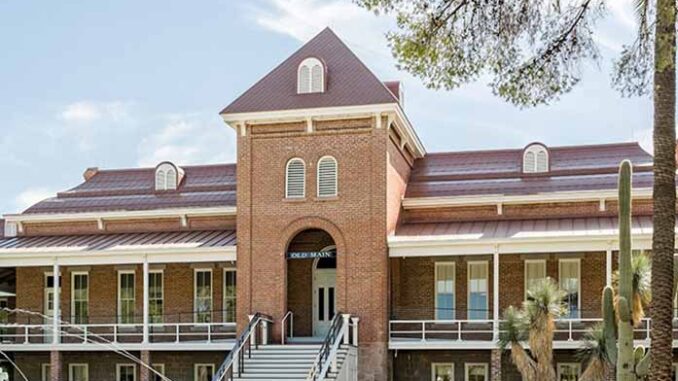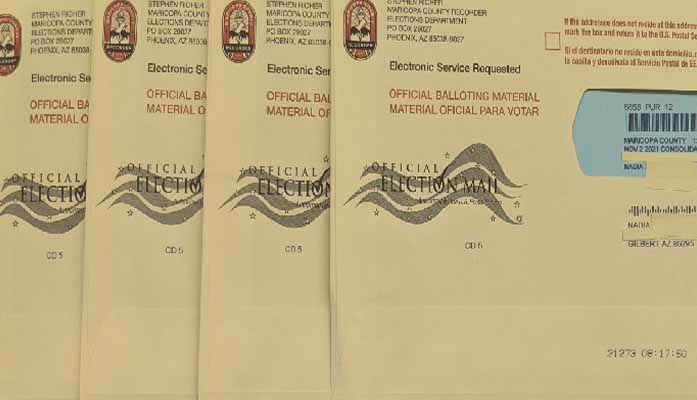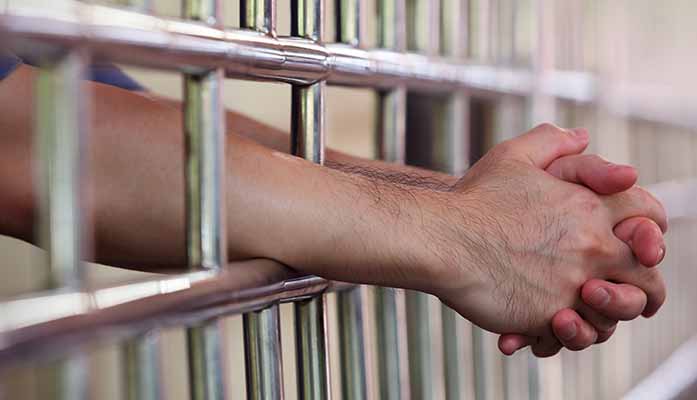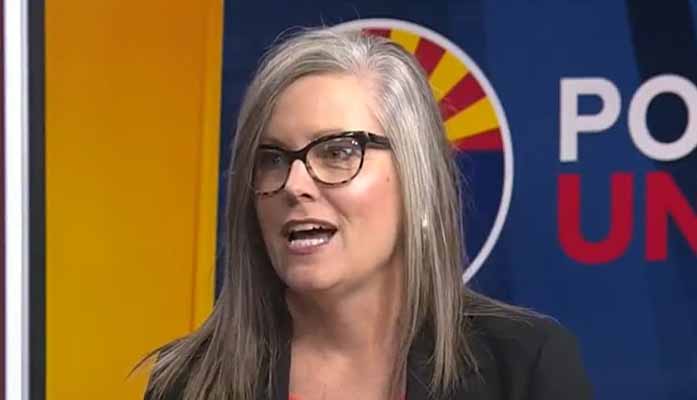
by Corinne Murdock | May 24, 2022 | News
By Corinne Murdock |
A new Tucson-based abortion rights group, Arizonans for Reproductive Freedom, began gathering signatures for a ballot initiative making abortion a right within the Arizona Constitution. The group filed their application last Monday. With a July 7 deadline, they have a little over six weeks to collect over 356,000 signatures to qualify.
A University of Arizona (UArizona) College of Medicine professor and Tucson OB-GYN, Dr. Victoria Fewell, filed the application as the group’s chairwoman alongside the group’s treasurer: UArizona Senior Program Coordinator, Planned Parenthood Arizona Secretary, and former Pima County Democratic Party Executive Director Shasta McManus.
McManus has been active with Planned Parenthood Advocates of Arizona (PPAZ), recently voicing over a biographical feature on avowed communist activist and Black Panthers supporter, alleged black militant, and University of California professor Dr. Angela Davis. Last week, PPAZ Chairwoman Chris Love bragged about her husband assaulting a black Trump supporter while at a pro-abortion rally in Phoenix.
The proposed constitutional amendment not only declared the right to elective abortions at any point in a woman’s pregnancy. It reads as follows:
Every individual has a fundamental right to reproductive freedom, which entails the right to make and effectuate decisions about all matters relating to pregnancy, including but not limited to prenatal care, childbirth, postpartum care, contraception, sterilization, abortion care, miscarriage management, and infertility care.
Neither the state nor any political subdivision shall restrict, penalize, frustrate, or otherwise interfere with the exercise of the right to reproductive freedom, including: any individual’s access to contraception; pre-viability medical and surgical termination of pregnancy; or medical and surgical termination of pregnancy when necessary to preserve the individual’s health or life.
Neither the state nor any political subdivision shall restrict, penalize, frustrate, or otherwise interfere with a qualified, licensed healthcare professional providing medical services or any person providing non-medical services necessary for the exercise of the right to reproductive freedom.
The term ‘viability’ means the point in a pregnancy at which, in the good-faith medical judgment of the qualified, licensed healthcare professional, based on the particular facts of the case before the healthcare professional, there is a reasonable likelihood of sustained fetal survival outside the uterus with or without artificial support.
The activist group also began asking for donations.
The group filed the ballot initiative application about two weeks after the leak of a Supreme Court draft ruling determining whether abortions constitute a state issue.
Corinne Murdock is a reporter for AZ Free News. Follow her latest on Twitter, or email tips to corinne@azfreenews.com.

by Corinne Murdock | May 23, 2022 | News
By Corinne Murdock |
On Monday, the Arizona Senate passed HB2617 to require county recorders to cancel voter registrations for individuals who are proven to not be qualified electors, such as those who aren’t U.S. citizens and those who have a driver’s license or other non-operating license in another state. The bill passed along party lines, 16-13. Since HB2617 was amended in the Senate, it will be reviewed by the House before it’s passed on to Governor Doug Ducey.
In further detail, HB2617 will require the Arizona Department of Transportation (ADOT) every month to submit information regarding who’s been issued a driver’s license or non-operating license in another state to the secretary of state. Then within 10 days, the secretary of state will also be required to furnish county recorders with a list of registered voters for their county that were issued a driver’s license or a non-operating ID license in another state.
Additionally, HB2617 requires the county recorder to compare their voter registration database to the Social Security Administration database on a monthly basis. In the event an individual doesn’t provide satisfactory proof of citizenship, county recorders must compare their file to the Electronic Verification of Vital Events System.
Furthermore, the secretary of state will be required to report the number of deaths and number of voter registration cancellation notices issued to county recorders to the state legislature on a quarterly basis. Jury commissioners and managers must also forward information about individuals who indicate they’re not a U.S. citizen or reside outside of the county to the secretary of state and county recorder.
Prior to canceling the voter registration of the person in question, county recorders must submit notice to the individual and give them 90 days to provide evidence that they’re qualified to vote in Arizona. If the person doesn’t respond with satisfactory evidence within 90 days, each individual case may be referred to the county attorney or attorney general for further investigation.
Progress Arizona, a progressive activist nonprofit, argued that the legislation would “harm vulnerable communities,” calling it an “unnecessary barrier to vote.”
House Republicans insisted that the legislation, sponsored by State Representative Joseph Chaplik (R-Scottsdale) would ensure that those who didn’t belong on the voter rolls would be purged.
Corinne Murdock is a reporter for AZ Free News. Follow her latest on Twitter, or email tips to corinne@azfreenews.com.

by Corinne Murdock | May 23, 2022 | News
By Corinne Murdock |
On Monday, Governor Doug Ducey signed a bill requiring superior court clerks to submit monthly records of felony convictions to the secretary of state for purposes of purging the voter rolls.
State Senator Kelly Townsend (R-Mesa) introduced the bill, SB1477. The law provides additional identifying information for felons, including their date of birth and parents’ names.
“Each month the clerk of the superior court shall transmit to the secretary of state without charge a record of every felony conviction in that county within the preceding month. This record shall include only the name of the person convicted and the person’s date of birth, Social Security number, if available, usual legal residence and, if available, father’s name or mother’s maiden name. The secretary of state shall use the record for the sole purpose of canceling the names of convicted felons from the statewide voter registration database and shall notify the appropriate county recorder, and that county recorder shall cancel the voter registration of the convicted felon.”
The law was reportedly prompted by an ABC15 investigation into state law last November exposing a loophole allowing felons to register to vote illegally. Prior to Townsend’s bill, there wasn’t a system for election officials to discern which felons remained ineligible to vote or had their voting rights restored.
Jen Marson, Arizona Association of Counties Executive Director, expressed support for the legislation during hearings on the bill earlier this year.
Corinne Murdock is a reporter for AZ Free News. Follow her latest on Twitter, or email tips to corinne@azfreenews.com.

by Corinne Murdock | May 23, 2022 | News
By Corinne Murdock |
Last Friday, Congresswoman Debbie Lesko (R-AZ-08) joined a letter asking Centers for Disease Control and Prevention (CDC) Director Rochelle Walensky what legal authority her agency had to purchase Americans’ location data.
The CDC reportedly shelled out $420,000 for one year of phone data from at least 20 million Americans’ phones. The CDC’s transaction and its purposes were exposed through documents obtained by VICE through open records requests.
The CDC documents outlined plans to use the data to not only track COVID-19 curfew and quarantine compliance but visits to places of worship, K-12 schools, pharmacies, neighbors, parks, gyms, weight management companies, grocery stores; as well as the movements of Navajo Nation peoples, K-12 bus route users, and college students, to name a few. According to the documents, the CDC purchased the geotracking data from the controversial data broker SafeGraph. In doing so, the CDC relied on the same type of data currently being scrutinized for its use to track potential ballot harvesters, or “mules,” as highlighted in the controversial documentary “2000 Mules.”
Lesko joined 18 other legislators led by Congressman Kelly Armstrong (R-ND) to demand answers from the CDC. They expressed concern over the legality of the CDC surveilling Americans, citing a 2018 Supreme Court ruling that determined that mobile location information fell within a reasonable expectation of privacy.
“This violates the rights of Americans!” tweeted Lesko.
The congressman asked the CDC to explain what legal authority they had to acquire location data (especially concerning places of worship and its relation to the First Amendment), whether they obtained legal advice in order to do so, and whether they informed Congress of their intent to do so; if they’d requested Congress within the last five years to enact legislation specifically authorizing the purchase or acquisition of location data; what specific appropriation line item funded the purchase of the location data, and if they conducted an internal review to ascertain the compliance of their purchase; what form they purchased the data and if it included any personally identifiable information or it was in an aggregate, anonymous form; whether the data had been deleted or was being repurposed for other uses; what conclusions, analyses, or other methods were the results of their data acquisition; whether this was the only instance of them purchasing location data; who decided to purchase the data; and who has access to the data.
This wasn’t the first time that the CDC relied on SafeGraph. Throughout the 2020, they relied on SafeGraph information to conduct their reports on Americans’ compliance with stay-at-home orders. According to the documents obtained by Vice, the CDC continued relying on SafeGraph’s public data until the company no longer provided their data for free last March.
Corinne Murdock is a reporter for AZ Free News. Follow her latest on Twitter, or email tips to corinne@azfreenews.com.

by Corinne Murdock | May 22, 2022 | News
By Corinne Murdock |
Secretary of State and Democratic gubernatorial candidate Katie Hobbs declared it was “ridiculous” that the border crisis was a core issue for the governor’s race. Hobbs made the remarks during an interview with the Arizona Republic.
Hobbs asserted that it wouldn’t matter how she talked about the border because Republicans would only twist her words. It is unclear whether her observation came from recent controversy over her apparent reversal on the Biden administration’s plan to rescind Title 42.
“It’s ridiculous that we are talking about this as a core issue in the governor’s race,” said Hobbs. “I could stand here and say ‘Build the wall,’ and they’re gonna call me open borders. It doesn’t really matter what I say for the Republicans, they’re going to just misconstrue everything.”
Hobbs’ latest statement appears to be a pivot from her remarks issued last October, when she insisted that alleviating border crisis pressures would be one of her primary focuses as governor.
“The situation at our border puts pressure on all our communities. We have to reduce illegal border crossings in a way that promotes security and safety for everyone and most efficiently uses taxpayers’ dollars,” said Hobbs. “Arizonans need a leader who is learning from the officials who are on the front lines and understand this important issue best. I’m committed to listening, learning, and working on the ground to ensure our borders are secure.”
Hobbs also changed her perspective on the revocation of Title 42 recently. Within one month, Hobbs shifted her public message from supporting Title 42’s immediate end because it “isn’t working” to declaring that doing so would be a “rash decision” that would result in a “disaster.”
Hobbs hasn’t been the only Democratic candidate for a state-level office to dismiss border concerns this week. Democratic congressional candidate and former state senator Kirsten Engel went one step further, arguing that the current state of the border doesn’t constitute a crisis.
Engel issued that assessment during a Wednesday night debate hosted on “Arizona Horizon” by PBS. Engel’s Democratic opponent, State Representative Daniel Hernández Jr. (D-Tucson), contended with her denial of the border crisis.
Hobbs and Engel represent a greater division within their party on the significance and reality of the border crisis. Hobbs’ opponents, Aaron Lieberman and Marco Lopez, have each offered their own takes. Lieberman has said he will defer to federal actors to work out the border crisis.
Lopez has insisted that rhetoric painting the border situation as dangerous was misleading.
“There is no invasion,” said Lopez.
Corinne Murdock is a reporter for AZ Free News. Follow her latest on Twitter, or email tips to corinne@azfreenews.com.





